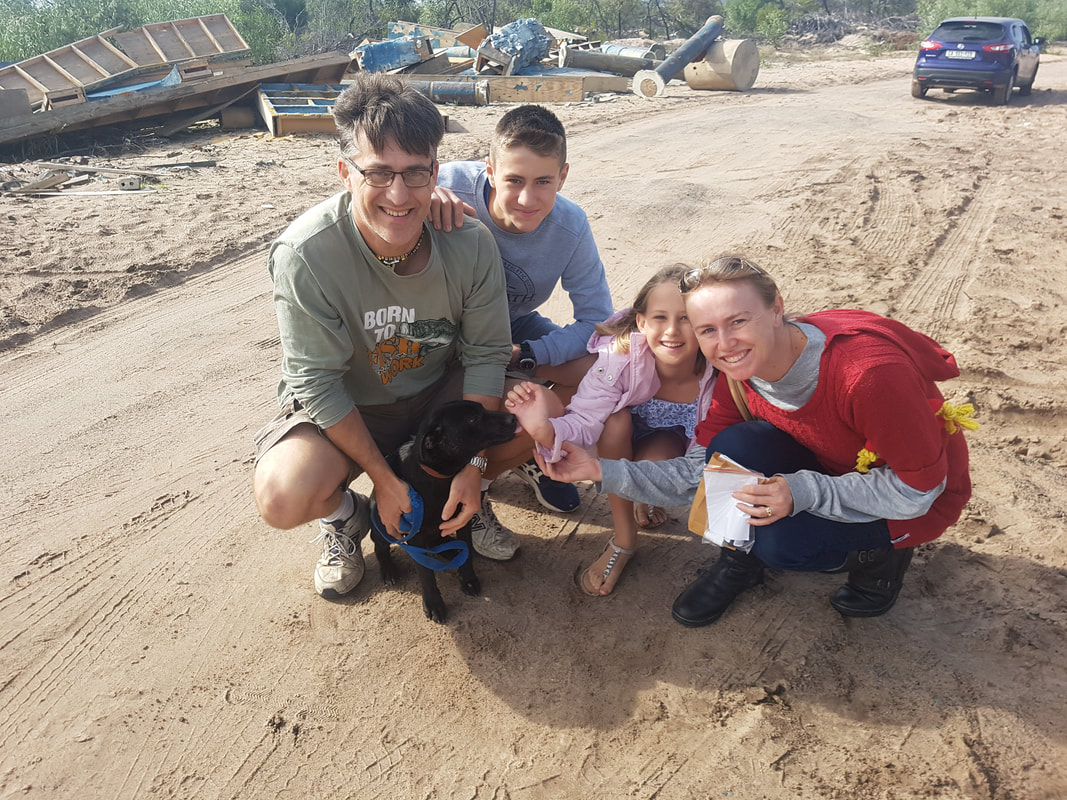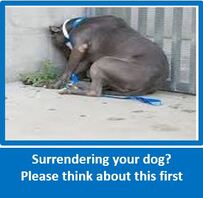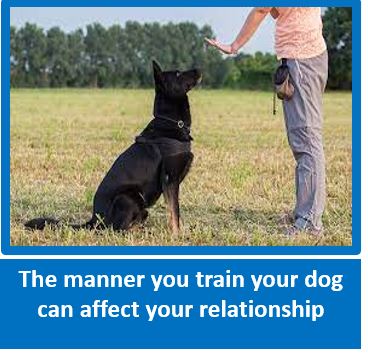
If you are choosing a cross breed dog, do consider having a DNA test to determine what breeds it is made up of. By knowing the breed/s, you will be able to find out both genetic and common health concerns, behaviour quirks that are common to the breeds, why the dog does the things it does, and very importantly, its social skills relating to breeds, and you can also check what other breeds are compatible. Easy to do, and in the comfort of your own home. Do visit our website for more info, and you are welcome to contact us. www.muttmix.co.za
|
Why are dog adoption fees so expensive?
by Scotty Valadao - www.fods.co.za Canine Behaviourist, TTouch Practitioner, Founder FOTD - www.friendsofthedog.co.za |
It has occurred, that when wonderful, kind hearted people decide to give a dog a home that comes from a shelter, breed rescue organization or similar, they are often surprised that an adoption fee is charged - they are giving a dog a home that is much needed, so why should they pay for the dog at all? Alternatively they may think that the adoption fee should be much lower. The way the cost of living is increasing, these figures are going to much higher on an annual basis.
The adoption fees can range form approximately R500 to R1200 depending on the organization they are adopting from. You may even find the occasional shelter that adopts dogs out at a lower cost, or even for free - just bear in mind that you get what you pay for!
On average the adoption fee will cover the vaccincations, and unless it is a puppy, the majority of the time the dog has already been sterilized and dewormed. Many shelters include the microchip in the adoption fee as well.
Although the adoption fee may sound high, once you consider the costs mentioned below, you will realize that not only is the adoption fee very low, you have already saved yourself a considerable amount of money - think of the cost of vaccinations, microchip and sterilization if you had to do it, and that would be at standard vet charges!
Having worked in shelters extensively over the last several years, we have been astonished to realize just how much time, effort and money it takes to keep a shelter open - these people really deserve medals and as much help and support as we can give them.
If it is a private shelter (of which there are many as so many dogs and cats are in trouble and need homes), consider that these private shelters do not receive a cent from Government or Municipalities - a situation we really feel needs to be rectified. There should be a system in place whereby a private shelter fulfils certain criteria, including the health and capacity aspects, and then becomes an 'approved' shelter, and much needed funds can be channelled to them from Government and the Municipality concerned for the wonderful work and service they are supplying.
As in the paragraph above, at this time, to the best of our knowledge, all private shelters are reliant on sponsors and the good hearted people who will give them items to sell in their Charity Shops to raise funds, schemes such as Woolworths have etc, and the wonderful, caring people who will give a bag of food, or whatever they can afford, even if only R10 - Bless you All!!!!
Additionally, do bear in mind that shelters can cater to a maximum amount of dogs and simply cannot take in more when the maximum number has been reached - to do so would strain them past their capabilities, and also affect the standard and quality of lives of the existing dogs in the shelter. We have all seen what can happen when a shelter does take in too many dogs, and it almost becomes a hoarding situation, where the dogs in the shelter are not receving the care they need, are often in sub standard conditions and many in bad health, and the NSPCA has to be called in - these are not 'bad' people, they just want to help all dogs, however, they have not learnt how to say NO, and realize that we can only do so much - we cannot save all the animals.
It has occurred that when shelters do have to turn a dog away, which we know totally breaks their hearts, that they will receive a lot of criticism for having turned the dog away - people do not always realize how hard it is for them to do this - this just adds to the emotional stress that people running shelters are exposed too.
What we also don't always seem to understand, is that the buck stops with the shelter so to speak, and in addition to the unbelievable stress of the financial implications, they are on call 24/7, experience the emotional trauma of having to say no to a dog coming in when they are full as above, have to organize daily medical care, exercise and feeding. Many run Charity Shops to help with expenses which has to be supervised, organize staff, vet visits, home checks, arrange Meet and Greets, adoption days and events to raise funds - are responsible for maintenance, have the terrible job of having to take a dog to a vet when there may be no option but euthanasia.
Plus, they have all the paperwork that goes with this, as well as finding the time to look after Facebook and other social media pages and their website, and post the dogs that are up for adoption and answer questions - are there really that number of hours in the day for these guys!
So many of these wonderful people that run shelters, always put the dogs above their own needs, also remembering that there are families needs to be considered and running their own homes, taking children to and from school, homework, school events etc, is it any surprise that Compassion Fatigue occurs! We are putting up another article on Compassion Fatigue this week and will post on FBook and then link here.
We have taken figures from several shelters, worked out an average, and then broken them down per dog, so that you can get an understanding of the kind of monies that shelters have to find on a monthly basis below.
The adoption fees can range form approximately R500 to R1200 depending on the organization they are adopting from. You may even find the occasional shelter that adopts dogs out at a lower cost, or even for free - just bear in mind that you get what you pay for!
On average the adoption fee will cover the vaccincations, and unless it is a puppy, the majority of the time the dog has already been sterilized and dewormed. Many shelters include the microchip in the adoption fee as well.
Although the adoption fee may sound high, once you consider the costs mentioned below, you will realize that not only is the adoption fee very low, you have already saved yourself a considerable amount of money - think of the cost of vaccinations, microchip and sterilization if you had to do it, and that would be at standard vet charges!
Having worked in shelters extensively over the last several years, we have been astonished to realize just how much time, effort and money it takes to keep a shelter open - these people really deserve medals and as much help and support as we can give them.
If it is a private shelter (of which there are many as so many dogs and cats are in trouble and need homes), consider that these private shelters do not receive a cent from Government or Municipalities - a situation we really feel needs to be rectified. There should be a system in place whereby a private shelter fulfils certain criteria, including the health and capacity aspects, and then becomes an 'approved' shelter, and much needed funds can be channelled to them from Government and the Municipality concerned for the wonderful work and service they are supplying.
As in the paragraph above, at this time, to the best of our knowledge, all private shelters are reliant on sponsors and the good hearted people who will give them items to sell in their Charity Shops to raise funds, schemes such as Woolworths have etc, and the wonderful, caring people who will give a bag of food, or whatever they can afford, even if only R10 - Bless you All!!!!
Additionally, do bear in mind that shelters can cater to a maximum amount of dogs and simply cannot take in more when the maximum number has been reached - to do so would strain them past their capabilities, and also affect the standard and quality of lives of the existing dogs in the shelter. We have all seen what can happen when a shelter does take in too many dogs, and it almost becomes a hoarding situation, where the dogs in the shelter are not receving the care they need, are often in sub standard conditions and many in bad health, and the NSPCA has to be called in - these are not 'bad' people, they just want to help all dogs, however, they have not learnt how to say NO, and realize that we can only do so much - we cannot save all the animals.
It has occurred that when shelters do have to turn a dog away, which we know totally breaks their hearts, that they will receive a lot of criticism for having turned the dog away - people do not always realize how hard it is for them to do this - this just adds to the emotional stress that people running shelters are exposed too.
What we also don't always seem to understand, is that the buck stops with the shelter so to speak, and in addition to the unbelievable stress of the financial implications, they are on call 24/7, experience the emotional trauma of having to say no to a dog coming in when they are full as above, have to organize daily medical care, exercise and feeding. Many run Charity Shops to help with expenses which has to be supervised, organize staff, vet visits, home checks, arrange Meet and Greets, adoption days and events to raise funds - are responsible for maintenance, have the terrible job of having to take a dog to a vet when there may be no option but euthanasia.
Plus, they have all the paperwork that goes with this, as well as finding the time to look after Facebook and other social media pages and their website, and post the dogs that are up for adoption and answer questions - are there really that number of hours in the day for these guys!
So many of these wonderful people that run shelters, always put the dogs above their own needs, also remembering that there are families needs to be considered and running their own homes, taking children to and from school, homework, school events etc, is it any surprise that Compassion Fatigue occurs! We are putting up another article on Compassion Fatigue this week and will post on FBook and then link here.
We have taken figures from several shelters, worked out an average, and then broken them down per dog, so that you can get an understanding of the kind of monies that shelters have to find on a monthly basis below.
(Many of the costs we have mentioned are at Shelter rates - privately at a vet would cost more)
- Food - the average seems to be about R260 - R300per dog, however this does not include the dogs that are on a special diet due to their needs, and due to the appalling state of health in which some dogs arrive at the shelter. Two hundred and sixty Rand may not sound much, and people do donate food, but is seldom enough - if we look at a shelter with 100 dogs that is R26700 - R30000 per month, and if we look at 320 dogs (which there are in some shelters) that is a whopping R85440 per month!
- Intake & Pest Maintenance- each dog that comes is, in addition to any medical conditions that needs attention, is vaccinated and dewormed, and dogs in the shelter are kept up to date with same. Average R250 per dog. 100 dogs = R25000, 320 dogs R80000. Yes, there are donations given from some fantastic companies that manufacture these products, but again, never enough to go round.
- Microchip - when a dog is adopted out, it is microchipped, and often with the shelters details, so that if the dog gets lost, the shelter can step in immediately. The average cost of microchipping seems to be R250.00. Depending on the amount of adoptions per month, this could range from R1000 for 40 dogs to R2000 for 80 dogs.
- Staff wages - this seems to average out at about R3000 - R4000 per person. Consider that each staff member will be in charge of 10 - 40 dogs, depending on the size of the shelter. Take a shelter of 200 dogs, at 40 dogs per person, gives you 5 kennel staff and adding on two managers who run the shelter at same figure, this gives you 7 people at R4000 - resulting in approximately R28000 per month.
- Maintenance - fortunately materials such as fencing, IBR, gates etc are often offerered at reduced prices to shelters and sometimes donated, but even so, in our research, the average cost was in the region of R3000 - 5000 per month. Fences etc are being fixed constantly.
- Extras - fortunately items such as toys, leads, collars, food bowls, blankets are normally donated, so not often extras for these. However, consider the additional stress that shelters in the Cape where under last year with the drought - water had to be found and brought in. What about when there is too much rain and the runs become flooded? These are just not things we tend to take into consideration.
- Sundry - cell phones, landlines, paper, computer maintenance, internet such as WIFI or Fibre, website costs, petrol, care maintenance and possible car instalments etc.
- Electricity and Water - the average worked out at about R400 per dog for electricity, and for water R25 per dog based on 200 dogs. This still gives total of R5000 per 200 dogs and R8000 for electricity. This includes the cost of staff being housed at the shelter.
- Outreach Programs - we were unable to guage an average for this as it varies so much from shelter to shelter, but included would be time, petrol, dewormers, vaccinations and food. It also seemed that from these Outreach programs, at least two dogs per month were brought into the shelter and in a terrible condition.
- Vet Bills - these can become astronomical when a dog comes in with serious medical problems, especially abuse such as being beaten, set on fire, sexual abuse, mange, broken bones. dogs being used as bail dogs or fighting dogs etc, and X-rays, operations, anti-biotics etc would be needed. Then take into account the Golden Oldies, who also need increased vet assistance, or dogs with diabetes etc. We took the average, excluding sterilizations and it works out to approximately R10000 per month, and these are at shelter rates, not what the public would pay.
- Sterilization - if the dog is not sterilized when it comes in, this is one of the first things to be done after ensuring that the dog is healthy enough to be sterilized. Shelter rates are in the region of R1500 - R2500 per dog, depending on size. If we think that there are about 100 - 300 dogs in the shelter at any one time, and all of these have been sterilized, we can see how expensive this exercise is - however, a necessary one.
- Gas - many of the shelters use gas in addition to electricity, and this normally comes in at about R2000-R3000 per month. .
Let's assume that 50 adoptions are done a month, at an average of R700 per dog which gives you R35000 income per month, which simply does not cover what is needed, and unfortunately, due to the current economic climate in the country, where jobs are being lost and many people are in dire financal crises, adoptions seem to be down at all the shelters and the forecast is that this may well get worse, and of course will impact on donations and fund raising.
Even though the dog you decide to adopt may not have needed anything other than normal pest care and vaccinations, and may have come in and is going out quickly, the money that is raised by the adoption fee is put to keeping the dogs left in the shelter fed and healthy.
Many of the shelters have obtained PBO status, which means that if you donate you will receive a Section 18A towards your own tax - what a wonderful way to make a donation and help your tax situation at the same time.
Once again, please do all you can to help your local shelter, especially adopting from them, and if you simply dont have the financial ability, then do consider going to walk a dog, or sitting in a run and giving some love to dogs that need it so badly. If we could all find it in our hearts (and budgets), to give a minimum of R20 to a shelter of our choice on a monthly basis (more if possible), just think how much help we would be giving - R20 may not be a lot, but it all adds up - 10 people giving R20 almost buys a bag of food.
To all of those that have donated, or are donating, from the bottom of our hearts THANK YOU - you really are making a difference and we think you rock, and we know how much your shelter appreciates you - think about it, without you, private shelters would have to cease - a frightening but realistic face!
September 2020





